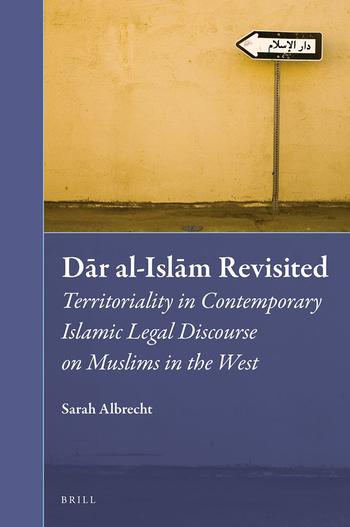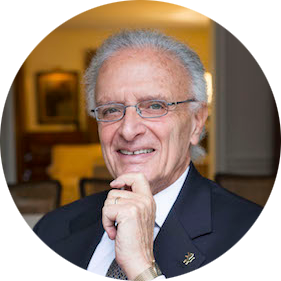
Dār al-Islām Revisited: Territoriality in Contemporary Islamic Legal Discourse on Muslims in the West by Sarah Albrecht
Review by David R. Blumenthal
Albrecht begins her very fine study with a methodological introduction, a summary of the various pre-modern views of territoriality in Islam, and an overview of various Islamic views on territoriality in the modern period.
Part Two, the modern period, is the main focus of her work. There, Albrecht distinguishes four typologies for understanding the geo-religious status of Islamic and non-Islamic lands in modern and contemporary Islamic thinking. Each is composed of many people from diverse Islamic environments, which―together with the overlapping issues and conflicting lines of authority―make grouping such people difficult. Nonetheless, she presents in great detail the following lines of thinking.

The reinventors (chapter four) take the traditional concepts of dar al-Islam and dar al-harb and combine them with decolonialization, nationalism, and neo-fundamentalism to generate a geo-religious world divided into two parts. The first is dar al-Islam, “the territory of Islam,” which is composed of territory under Islamic rule that is usually (but not always) synonymous with modern Islamic nation states. The second is dar al-harb, “the territory of war,” which is composed of the rest of the world. Such territory is also called dar al-kufr, “the territory of disbelief.” Muslims who live in dar al-kufr are under obligation to practice jihad there or to emigrate to an Islamic land. Among the proponents of this view are: Abd al-Aziz Abd Allah Ibn Baz (1910-1999), Muhammad Sa’id Ramadan al-Buti (1929-2013), and Salah al-Sawi (born 1954).
The contractualists (chapter five) take into account the millions of Muslims who now live in the west (Europe, the United States, Canada, etc.). To the contractualists, these are serious Muslims who live in non-Muslim environments that provide protection and freedom to live and practice Islam. These Muslims need to have their existence legitimized, and they need guidance on their status within Islam and in the proper belief and practice for Muslims living in non-Muslim lands. Among the proponents of this view, Albrecht lists: Faysal Mawlawi (1941-2011), Yusuf al-Qaradawi (b. 1926), and Abd Allah Bin Bayyah (b. 1935).
These Muslims need to have their existence legitimized.
To accomplish their goal, the contractualists take two steps: First, they set Muslim existence in the west in the context of international treaties and covenants that recognize and protect Muslims and their religion. This enables them to declare the west as dar al-ahd, “the territory of treaty.” Second, the contractualists draw up a fiqh al-aqalliyyat, an interpretation of sharia specifically tailored for Muslims living in non-Muslim countries. This “minority law” is embodied in institutions such as the European Council for Fiqh and Research (ECFR), the Assembly of Muslim Jurists in America (AMJA), and the International Union of Muslim Scholars (IUMS). Each of these institutions maintains websites and issues fatwas, legal decisions, formal opinions, etc.
The reformers (chapter six) regard the concepts of dar al-Islam and dar al-harb / dar al-kufr as “plainly anachronistic.” Accordingly, they view these territorial designators as “merely a fiqh [legal] interpretation of the sharia that had its historical context” but which “is not infallible and is indeed changeable.” Consequently, they argue that “today’s jurists should simply discard these two concepts as history.” Among the proponents of this view, Albrecht lists: Taha Jabir al-Alwani (1935-2016), Isma’il Raji al-Faruqi (1928-86), Jasser Auda (b. 1966), and the International Institute of Islamic Thought (IIIT).
The other alternatives (chapter seven) consist of a group of Islamic intellectuals who would be classified in western thinking as strong liberals for whom the universal humanity of Islam is central. They maintain that if the traditional geo-religious structures and legal traditions contradict that universality, then they must be discarded. Among the proponents, Albrecht lists: Tariq Ramadan (b. 1962), Tareq Oubrou (b. 1959), and Aref Ali Nayed (b. 1962). In part three of the book, Albrecht reprises the material of these chapters by topic.
Albrecht’s book is thoroughly researched and carefully written. I cannot imagine another scholar needing to undertake this work again. However, Albrecht leaves us without a clear sense of which voices are “thundering”―that is, of who the dominant voices in the modern and contemporary period are.
To be fair, Albrecht does indicate which voices have had wide reception. Thus, she acknowledges the following: Abd al-Aziz Abd Allah Ibn Baz was the Grand Mufti, head of the Board of Senior Scholars, and head of the Permanent Committee for Research and Fatwa, among other important roles. Muhammad Salih al-Munajjid is “an ever-present media mufti who is being heard beyond the borders of Saudi Arabia and the Arab-Gulf states” (he also maintains a website). Muhammad Sa’id Ramadan al-Buti was the Imam of the Umayyad Mosque in Damascus, the “most prominent Syrian TV preacher, featuring more regularly than any other scholar on Syrian state tv. He also appeared on international channels such as Arabsat.” And, Yusuf al-Qaradawi is “[p]robably the most prominent contemporary Muslim scholar …”; a key member of the Muslim Brotherhood; a staunch supporter Hamas; the originator of fiqh al-aqalliyyat (the law for Muslims living in non-Muslim lands); a founder of the International Fiqh Academy; a founder of the Organization of Islamic Cooperation (OIC), the Muslim World League (MWL), and a founder and very active defender of the European Council for Fiqh and Research (ECFR), among other roles. “He is eager to spread his ideas via radio, internet, and satellite tv, most prominently through his regular appearances in the popular religious talk show al-Sharia wa-l-hayat (‘Islamic Law and Life’), broadcast by the Arabic tv channel of al-Jazeera. He was also the first ‘alim’ [Islamic scholar] to have a personal website in Arabic and has therefore played a pioneering role among present day fuqaha [legal scholars] by utilizing new media to disseminate his message. Marketing himself (and being marketed) as a ‘media sheikh’ has increased his popularity … Programmatically labeled the ‘Global Mufti,’ he has … managed to establish himself as the ‘best-known if not the most popular Muslim preacher-scholar activist of the early 21st century….’” Al-Qaradawi is also a prolific author having written books on jihad, on minority fiqh, and on the Jews, among many others (168-71, 184-92).
The “liberals” of the Islamic world are presented by Albrecht, but their voices are heard mainly in liberal western societies; their influence in the Islamic world is minor.
It is important to note that the most widely-listened-to authorities mostly consist of ”reinventors.” These are the authorities who accept and advocate for the traditional geo-religious split between dar al-Islam and dar al-harb. It is also important to point out that Al-Qaradawi, while portrayed as a moderate who advocates for human rights and Muslim adjustment to western society, actually has a terrible record when one consults his statements on human rights for non-Muslims, women, and gays in Islamic lands, as well as his views on Jews and the legitimacy of the State of Israel.
The “liberals” of the Islamic world are presented by Albrecht, but their voices are heard mainly in liberal western societies; their influence in the Islamic world is minor. It is precisely the most listened-to authorities cited by Albrecht who are the “thundering echoes” of the traditional concepts of dar al-Islam and dar al-harb in the contemporary Islamic world. They are the ones who most influence the opinions of the vast majority of Muslims worldwide. Although Albrecht does note on the last pages of her book (430-31) that her study needs to be supplemented by an ethnographic study of the reception and impact of these ideas on the various layers of the worldwide Muslim population, her desire to cite all streams of thought leaves the reader short on her judgment of which of those streams are important and why.
In spite of this fault, Albrecht’s work will be a requirement for reading for anyone interested in the traditional and modern understandings of territoriality in Islam. ♦

David R. Blumenthal teaches and writes on constructive Jewish theology, medieval Judaism, Jewish mysticism, and holocaust studies. He is the author of numerous scholarly articles and eleven books, a Senior Fellow at the Center for the Study of Law and Religion, and was the Jay and Leslie Cohen Professor of Judaic Studies at Emory University.
Recommended Citation
Blumenthal, David R. “Dar al-Islam Revisited: Territoriality in Contemporary Islamic Legal Discourse on Muslims in the West by Sarah Albrecht – Review by David R. Blumenthal.” Canopy Forum, May 8, 2020. https://canopyforum.org/2020/05/08/review-dar-al-islam-revisited/

